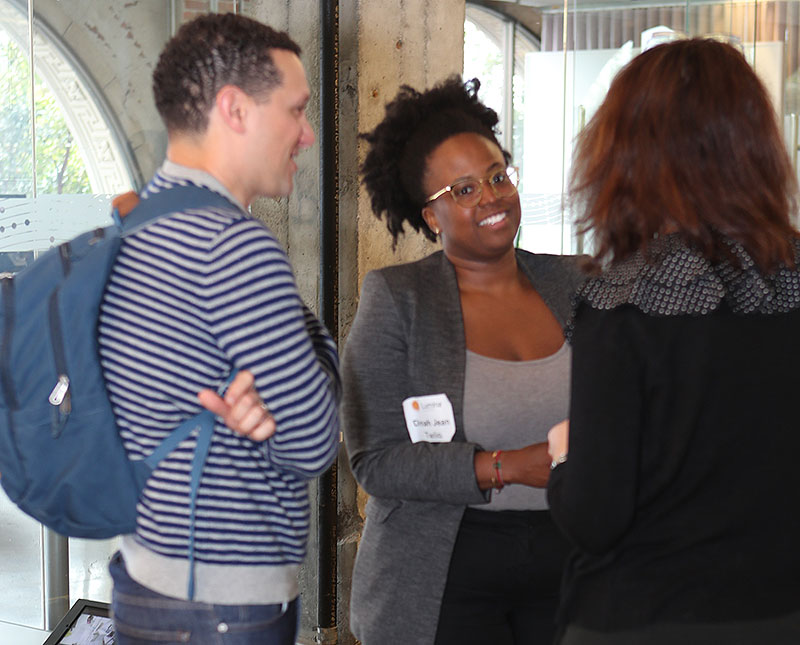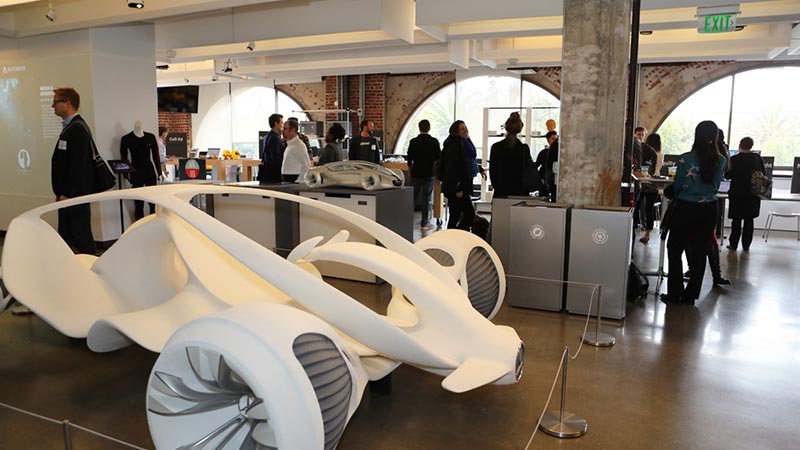
SAN FRANCISCO—More than a dozen early-stage companies met with potential investors, pitching their products in a “Demo Day” of new ideas and services to advance educational attainment.
“We need to have a range of tools to drive change, and this is an important one that allows us to deploy capital into these start-ups,” said Brad Kelsheimer, vice president and CFO of Lumina Foundation. Lumina hosted the event, in partnership with Autodesk Foundation, Twilio.org, and SAP.iO.
Attendees had the opportunity to network, demo their products and services, and pitch potential investors and customers interested in impact investing—the use of capital to promote social change, including racial equity in post-high school learning and training.
Autodesk Foundation supports innovators working on issues including the future of work, workforce development, and equity.
“Many of the organizations here are very much in alignment with how we think about our investments,” said Ryan Macpherson, the foundation’s portfolio investment manager.
Macpherson noted the growth in automation and artificial intelligence technologies.
“Like everyone else who is working in this space we know there are going to be some disruptions in the way in which people work,” he said. “These tools are vitally important in addressing these difficult problems, but they’re going to exacerbate some of the issues that we already see in today’s labor market.”
Racial equity is a major concern for those focused on growing educational attainment. As Macpherson and others note, it’s also a concern for investors.
“There are some people who are going to be well positioned to take advantage of these (technology) opportunities, given their access and resources. And there are going to be some people who are not.”
It’s important while addressing issues of equity in education not to forget about pursuing equity in opportunity in the solutions, said Dinah Jean, impact program manager of Twilio.org, the social impact arm of Twilio.
“When we’re working with grantees or the people we invest in, we’re always asking the question, ‘How do you engage the communities that you serve and the solutions that you’re building?’ she said.
“The question is, ‘Do you understand what your users need? Do you ask the questions about what solutions they want? What are the problems they’re seeking to address in their lives?’ Because that’s when you really know you’re solving for the right thing.”

In the Silicon Valley universe of incubators, accelerators, and cutting-edge tech startups, “demo day” is a common term, referring to a session for pitching products directly to investors and for making connections.
These relationship-building events are behind many of the technologies we hear about today, from new social networking apps to virtual reality programs to driverless cars.
Lumina Foundation is working to ensure that more adults have relevant and in-demand skills—a concern vital to meeting the needs of tomorrow’s labor market.
To build a more dynamic, adaptive, and inclusive next-generation workforce and society, we need new educational pathways that work for a diverse population, including adults, students of color, immigrants, and students from low-income families.
Eight of the companies attending Monday were portfolio investees of Lumina Impact Ventures, the foundation’s social impact investing strategy that aims to invest and engage in the private sector in a way that attracts new ideas, new knowledge, and new capital to address the challenges that these populations face.
The companies presented a wide range of digital tools, educational platforms, career training programs, and other solutions designed to connect underserved students with the information, resources, and support they need to obtain in-demand skills and quality credentials. They included:
- Bitwise Industries — A technology education hub working to transform Fresno, California, and the Central Valley into one of the fastest-growing tech centers in the U.S. and to build an industry that’s more inclusive of marginalized groups like immigrants, people of color, women, veterans, people released from prison, and people who have been out of work for long periods of time.
- BrightHive—A company using “smart” data collection to create a trusted platform that gives education providers, employers, government agencies, and other organizations the confidence they need to share data responsibly, securely, and ethically and foster greater collaboration.
- CareAcademy—A company that provides training for in-home caregivers, seeking to empower them to deliver the best care possible to older adults and make it easier for them to “upskill” and continue their education as they advance their careers.
- Cell-Ed—A provider of educational content through a text-based and web-accessible platform that helps adults acquire literacy, language, and other workforce-ready skills.
- Credly—A technology platform with a mission to help every person have a portable, verified record of all their skills and abilities that allows them to share and manage digital badges and credentials and empowers the recognition of lifelong achievement.
- DISCO– A digital application that helps companies engage with their employees, bring their culture to life online, and help people feel more connected and appreciated at work by cultivating individual profiles that showcase skills, strengths, and accolades.
- Edovo—A leading provider of tablet-based education tools for incarcerated adults with a mission to help everyone affected by incarceration be prepared with the skills they need for a successful life outside of the correctional space.
- Edquity—A college planning and financial matching platform with an app that supports learners through every financial challenge related to the college decision-making process and helps students identify essential services such as on-campus food assistance, child care, and emergency grant programs.
- Gnowbe—A micro-learning, skill-building platform that features customized content and digital tools designed with the mobile, on-the-go learner and the modern workforce in mind.
- NextPlay—A company that helps employers maximize employee engagement, performance, and retention using a digital platform that facilitates mentorships, feedback loops, and other relationship-building connections.
- RallyBright—A firm with a platform that leverages behavioral science and professional development tools for businesses to analyze internal team dynamics, identify strengths and vulnerabilities, and improve performance, with the goal to empower managers to be better leaders and to help leaders build stronger teams by giving them a clear action plan.
- Sounding Board—A leadership development platform that offers scalable, personalized coaching to help companies adapt to the needs of a constantly evolving workforce and grow their next generation of leaders.
- Upswing—An education company providing technology-enabled student support services and solutions to help more people stay engaged, complete their college programs, and earn high-quality degrees and credentials.
By bringing together like-minded entrepreneurs, investors, and leaders in business, higher education, and philanthropy through experiences like Demo Day, Lumina Foundation strives to spark conversation, build critical alliances, and drive progress toward achieving more equitable outcomes in education.
To learn more about Lumina Impact Ventures and the foundation’s portfolio investees, visit https://www.luminafoundation.org/lumina-impact-venures.
